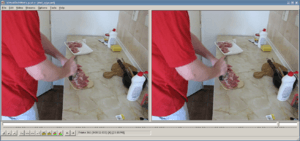VirtualDub
 | |
 | |
| Developer(s) | Avery Lee |
|---|---|
| Stable release | 1.10.4.35491[1] / October 27, 2013 |
| Written in | Assembly language, C++ |
| Operating system | Microsoft Windows |
| Type | Video editing software |
| License | GNU General Public License |
| Website |
www |
VirtualDub is a free and open-source video capture and video processing utility for Microsoft Windows written by Avery Lee. It is designed to process linear video streams, including filtering and recompression. It uses AVI container format to store captured video.[2]
Features
VirtualDub is designed for Microsoft Windows but may run on Linux and Mac OS X using Wine. (For example, to use it with the popular Deshaker plugin.[3]) However, native support for these systems is not available.
VirtualDub operates exclusively on AVI files. Appropriate video and audio codecs need to be installed.
Video capture
VirtualDub supports both DirectShow and Video for Windows for video capture. Capture features include capture to any AVI variant, audio VU meters, overlay and preview modes, histogram, selectable crop area, video noise reduction, auto stop settings (based on capture time, file size, free space, and/or dropped frames), and designate alternate drive(s) for capture overflow. VirtualDub can help overcome problems with digital cameras that also record video. Many models, especially Canon, record in an M-JPEG format incompatible with Sony Vegas 6.0 and 7.0. Saving AVI files as "old-style AVI" files allows them to appear in Vegas.
VirtualDub supports DV capture from Type 2 (VfW) FireWire controllers only. (It cannot work with Type 1). There is no DV batch capture, still image capture, or DV device control capability.
Video assembly
VirtualDub can create a video file from a series image files in Truevision TGA or Windows Bitmap file formats. Individual frames must be given file names numbered in sequential order without any gaps (e.g. 001.bmp, 002.bmp, 003.bmp...). From those, the frame rate can be adjusted, and other modifications such as the addition of a sound track can be made.
VirtualDub can also disassemble a video by extracting its sound tracks saving its frames into Truevision TGA or Windows Bitmap files.
Editing
VirtualDub can delete segments of a video file, append new segments, or reorder existing segments. Appended segments must have similar audio and video formats, dimensions, number of audio channels, frame rates and sampling rates. Otherwise, VirtualDub is incapable of mixing dissimilar video files or adding transition effects between segments.
VirtualDub comes with a number of video editing components known as "filters". They can perform such tasks as reducing the video size by half, converting the video to grayscale and arbitrary rotation. Filters may be used during the video assembly as well. Filter plug-ins further extend VirtualDub's capabilities. A plug-in SDK is available for developers to create their own video and audio filters.[4]
Past legal issues
Early versions of VirtualDub supported importing of Microsoft's Advanced Systems Format, but this was removed in version 1.3d following an informal phone call from a Microsoft employee claiming that it infringed one of Microsoft's patents. Microsoft never identified any specific patent numbers that it believed to have been infringed, but speculation by others is that US 6041345 might be relevant.[5]
In August 2006, VirtualDub's German users who hosted copies of VirtualDub, or even linked to them on their web pages, began receiving cease and desist letters from a private individual that claimed to have German word mark on "VirtualDub".[6] However this issue has been resolved: the word mark in Germany has been deleted[7] and an injunction has been granted against the former owner of said word mark.[8]
Development

VirtualDub was originally created for the purpose of compressing anime videos of Sailor Moon.[9]
VirtualDub is free software, released under the GNU General Public License and hosted on SourceForge.net. The author has added support for input plug-ins, so now it can open almost any format including MPEG-2, Matroska, Flash Video, Windows Media, AC3, FLIC, QuickTime, MP4, PVN, Redcode RAW.
VirtualDub has spawned several forks, one being the abandoned VirtualDubMod which includes features such as Matroska (MKV), OGM, and Dolby AC-3 support, none of which are present in VirtualDub without the use of third-party plugins.[10][11][12] VirtualDubMod is a unification of several earlier projects/forks, including: VirtualDub-MPEG2, VirtualDubOGM, VirtualDubAVS and more.[11][12][13][14] Another example of a fork is Nandub, which enabled use of Smart Bitrate Control.[15]
See also
- Avidemux
- AviSynth
- Comparison of screencasting software
- Comparison of video editing software
- MediaCoder
- VirtualDubMod
References
- ↑ "VirtualDub Stable Versions at SourceForge.net". Retrieved October 27, 2013.
- ↑ "VirtualDub features".
- ↑ oldcpu. "HowTo install VirtualDub under wine with deshaker plugin". Retrieved 2010-01-13.
- ↑ VirtualDub SDK
- ↑ Advogato: Microsoft patents ASF media file format, stops reverse engineering
- ↑ Illicit word mark registered on "VirtualDub" in Germany - virtualdub.org
- ↑ Official status of German word mark 30601877 "VIRTUALDUB"
- ↑ "Preliminary injunction granted in regard to German word mark VIRTUALDUB"
- ↑ VirtualDub history - virtualdub.org
- ↑ "VirtualDubMod". Retrieved 2009-11-18.
- ↑ 11.0 11.1 AfterDawn.com. "VirtualDubMod v1.5.10.2". Retrieved 2009-11-18.
- ↑ 12.0 12.1 VideoHelp.com. "VirtualdubMOD". Retrieved 2009-11-18.
- ↑ Codecs.com (2005-08-30). "VirtualdubMod 1.5.10.2". Retrieved 2009-11-18.
- ↑ VideoHelp.com. "Virtualdub-MPEG2". Retrieved 2009-11-18.
- ↑ "Nandub / SBC Encoding". Nicky Pages' Digital Solutions. Retrieved 2009-11-18.
External links
- Official website
- Project page at SourceForge.net
- V3.co.uk Review
| ||||||||||||||||||||||